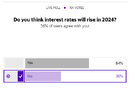- Joined
- 20 July 2021
- Posts
- 11,495
- Reactions
- 15,963
yes , one of those anomalies in finance reportingOf course should have used the term 10 year "yields".
Bonds in fact are trending down.
yes , one of those anomalies in finance reportingOf course should have used the term 10 year "yields".
Bonds in fact are trending down.
Bond yields and bond futures are easily mixed up , of course they move inverselyyes , one of those anomalies in finance reporting
that confusion ( by others ) worked very nicely for me between 2011 and 2016Bond yields and bond futures are easily mixed up , of course they move inversely
I said it at the beginning of the year that there's little chance you'll see a rate cut in Australia until next year sometime because a lot of it is forced inflation, How can prices go down when you have commodities and labour so high, and most companies have had years of good growth?RBA to lift cash rate to 5.1pc, says top forecaster

RBA to lift cash rate to 5.1pc, says top forecaster
Judo Bank’s Warren Hogan, who was ranked 2023’s most accurate forecaster, predicts a resurgent economy will force the RBA to lift rates to 5.1 per cent.www.afr.com
There is data trending in the right direction to semi support this view although IB futures are as dynamic and mean reverting as anything out there , atm we are seeing just a hint of a hike starting to be priced with the terminal rate now above the present cash rate for the first time in many months . The chart posted here is the projected terminal rate change in Sept as priced by IB futurtes , this chart is a little delayed with current pricing at +3 bps terminal rate in sept compared to the -50bps of cuts priced 2 months ago . Dec '24 getting closer to a full rate hike priced .
View attachment 175605 View attachment 175604
and Sam Walton ( of Walmart fame ) did much to help us arrive at this destinationNot a good sign for made in Australia, the 1980's globalisation unintended consequencies finally manifesting and making the West look impotent.
At least when Trump was in the Chinese were agreeing to discuss reciprical trade balance, now it looks like the U.S could be in the manure.
Bottom line is 2008 with the financial crisis marked a turning point with globalisation. Not the end, but a turning point which ended the trend up to that point.Not a good sign for made in Australia, the 1980's globalisation unintended consequencies finally manifesting and making the West look impotent.
At least when Trump was in the Chinese were agreeing to discuss reciprical trade balance, now it looks like the U.S could be in the manure.




Something has to happen when fuel prices have hit all-time highs in some capital cities.Reckons she is starting to see signs in her work load similar to the 80s "recession we had to have".
Local food hall and takeaway joints here always seem to be doing pretty well.Restaurants are packed as are adventure type outings.
This is definitely the take. Certain industries are in a weird zone. There's an ever gradual slide downwards as people stop spending on certain items or services. Hard to see where the bottom is as the drift down is fairly slow.That said, we both agreed there are mixed messages ATM.
Theres that word again.Australian retail sales weaker than expected
DAVID ROGERS
Australian retail sales are weaker than expected for March, falling 0.4 per cent versus the 0.2 per cent that was expected.
The previous monthly change is revised down to 0.2 per cent from 0.3 per cent initially recorded.
The data may easing interest rate jitters before the RBA meeting next week.
But they may also see some stagflation concerns emerging as inflation remains stubbornly high.
The data may ease interest rate jitters before the Reserve Bank meeting next week. But they may see some stagflation concerns emerge as inflation remains sticky.
The slow drift down IMO is because of the money injections, through direct subsisdies, wage increases and next the tax changes, from memory in the past this hasn't been tried, it will be interesting to see the end result.This is definitely the take. Certain industries are in a weird zone. There's an ever gradual slide downwards as people stop spending on certain items or services. Hard to see where the bottom is as the drift down is fairly slow.
Hello and welcome to Aussie Stock Forums!
To gain full access you must register. Registration is free and takes only a few seconds to complete.
Already a member? Log in here.